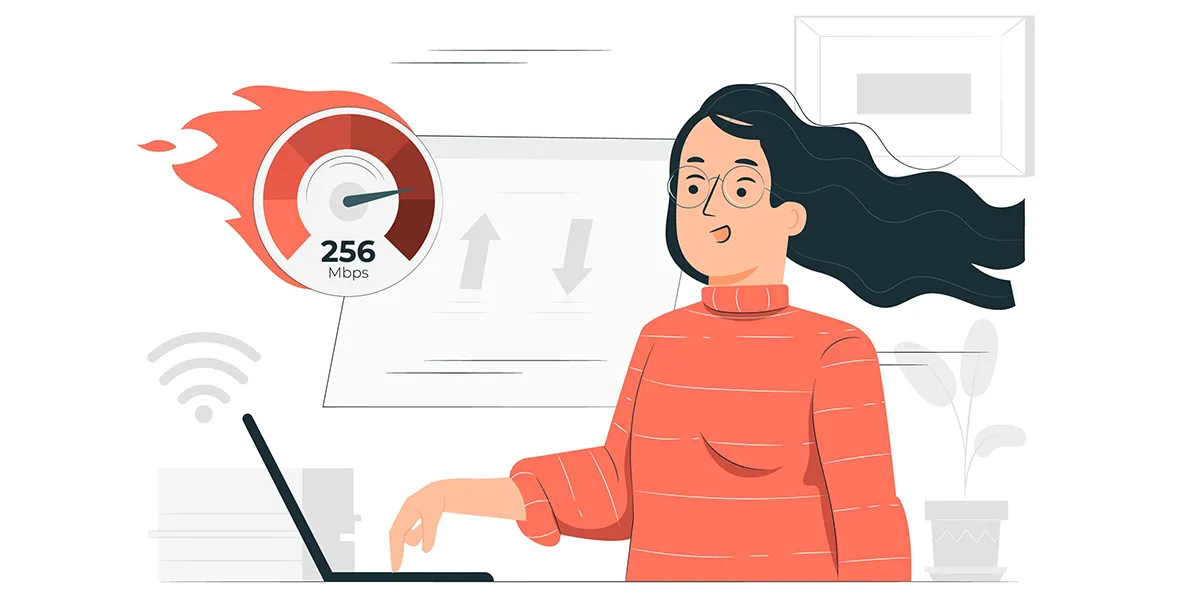When an internet user first visits your website, you have only a few seconds to make an excellent first impression. While the design and content play critical roles in a site’s success, contractors must also consider how fast it takes for their sites to load to maximize site conversions.
Here at Relentless Digital, we’re a web design agency for HVAC contractors, plumbers, electrical companies, and other local contractors. If you own an HVAC, plumbing, electrical, or other contracting company, you must understand the value of website speed and how it affects your business’s ability to attract new customers.
In this article, our team will teach you what site speed is, explain why it’s essential to digital marketing success, and offer tips on improving your site speed.
What Is Website Load Speed?
Website load time or speed refers to how fast your site loads when an internet user clicks on a page. In this modern digital age, where most consumers find local products and services online on their mobile devices, having a fast and reliable site is essential for attracting and converting qualified leads.
Fast websites make good first impressions on today’s users. And optimizing your site’s speed may help you improve your search ranking on Google, boost site conversions, and more.
Why Is Page Load Speed Important for Contractors?
Whether you run a local septic business or your company provides garage door installation and repair services, you rely on your website to supply your sales pipeline with consistent leads. If potential customers encounter slow loading speeds on your site, you’re likely missing out on sales.
Slow websites can significantly impact contractors due to poor user experience, low conversions, and a low search ranking on Google.
A Slow Website Affects User Experience
Today’s internet users expect instant gratification. When they click on a Google search result or type in a URL, they hope to see the page load quickly (within three seconds). Potential customers who encounter a slow website speed may become annoyed and frustrated with the site.
Even returning customers who have used your services in the past may hesitate to use your company again if they have a poor user experience on your website. Your local contracting company can provide a positive user experience by optimizing your site’s speed and ensuring your pages load quickly.
Slow Load Speed Affects Bounce and Conversion Rates
You can see the importance of your website’s speed in how visitors engage with your site. Because internet users expect fast load times when browsing for products and services online, contractors with slow websites often struggle with high bounce rates and low conversion rates.
What Is a Bounce Rate?
Your website’s bounce rate indicates the percentage of users visiting the site who click away after viewing only a single page. Generally, a low bounce rate indicates good website performance, while a high bounce rate signifies the need for site improvements.
Web page load time directly impacts the likelihood a consumer will remain on the website. According to research by Google and SOASTA, the probability of a bounce rises significantly the longer the load time. The chance increases by 32% from one second to three seconds, 90% from one to five seconds, and 123% from one to ten seconds.
Potential visitors make fast decisions when interacting with websites, so your site speed must keep up with them.
What Is a Conversion Rate?
Your site’s conversion rate refers to the percentage of conversions from all site visitors. A high conversion rate indicates excellent website performance.
Although site speed isn’t the only factor in how a site performs overall, having fast load times can boost your conversion rate, which means more sales and profits for your business. According to this infographic from Kissmetrics, conversion rates can drop 7% due to just a one-second page response delay. Contracting companies should prioritize site speed to ensure a positive user experience and boost their sites’ conversions.
Slow Page-Load Speed Impacts Google Search Rankings
Search engines like Google provide ranked search results to help internet users find what they’re looking for online. Google search rankings depend on many factors. One search ranking factor many business owners fail to consider is site speed, but the Google algorithm has included it since 2010.
Google offers searchers the most relevant and trustworthy results that provide the best possible user experience. Slow page speed can result in user frustration, so Google ranks websites with slow pages lower in organic search results.
Optimizing your site’s speed supports any search engine optimization (SEO) strategy by encouraging more trust from Google or another search engine. If you optimize your site speed to the recommended three seconds, you may enjoy higher Google search rankings and more visits to your site.
Tips for Boosting Site Speed
Improving your site speed can help your contracting company provide a positive user experience online, drive more sales and customer loyalty, and boost rankings in Google search results. Many of the methods our digital marketing team uses to improve site speed are quite technical, but here are some simple tips for boosting your webpage speed:
Determine Your Website’s Current Speed
We’ve discussed the importance of webpage loading speed but not how to gauge how your site is performing. Before optimizing your site’s performance, you need to understand the current speed of your desktop and mobile site and what elements are causing a slow page load time. Several tools exist to help site owners and developers analyze site speed, including the following:
- Google PageSpeed Insights provides user experience reports. It considers desktop and mobile users when collecting report data and offers improvement suggestions. Click the following link to learn more about this helpful tool.
- Pingdom offers another popular option for testing site speed. This tool provides site performance reports that include the speed of web pages and recommendations on shortening a site’s page load time.
- Professional digital marketers like the Relentless Digital team provide web design services that can help you reach a fast site speed. We can help transform an outdated, slow website into a high-converting tool for your business.
Consider a New Website Host
Server speed affects individual site speed, so you may need to move your website to a new host for a fast load speed. If your site uses shared hosting, it must compete for CPU, RAM, and disk space with all the other sites on the server.
Although shared hosting options cost less, other options, like virtual private servers (VPS), often offer faster loading speeds. A VPS provides users with personal server space not affected by the other sites on the server.
Research your hosting options, or speak with a professional web developer to determine the best host for your site. The web designers here at Relentless Digital would be happy to help you choose the ideal host for the fastest load time.
Optimize Images on Your Site
Contractors need many high-quality images on their sites to improve user engagement and provide examples of completed projects. Still, too many photos and other design elements can compromise a site’s load speed. Many faster sites have fewer elements to load or have optimized the images to prevent large files from slowing down the website.
Website designers and developers can encourage fast-loading sites by compressing images into smaller files before uploading them. Many web developers use HTML attributes that affect image size to ensure that every picture loads quickly and doesn’t negatively affect a user’s first impression of the site.
Setup Website Caching
Website caching can make a huge impact on site speed. When a user visits a web page, it loads after a database request is sent, so when many users are trying to load the same page, the loading speed can decrease for everyone. Caching allows the site to load an updated cached version of the page rather than going through the request process, speeding up load times.
Depending on the platform that hosts your website, you can set up caching through server settings or available plugins.
Identify Unused or Poor-Quality Site Plugins
Website owners and developers use plugins to add functions and features to their sites, but too many can increase page load time. If you have a website on a content management system (CMS) like WordPress and have a long list of plugins on your site, you can boost page speed by eliminating the ones you no longer use. Site performance reports may indicate which plugins are causing your slow site speed.
Site owners and developers should also research plugins before use to determine their quality and reputation. Poor-quality plugins may not function efficiently, causing slow loading speed.
Let Relentless Digital Optimize Your Website’s Speed
Our digital marketing experts at Relentless Digital can help you decrease your site’s loading speed. We understand the significance of website speed and will walk you through the entire web design process.
Our web design team creates gorgeous sites, focusing on all the critical aspects, from images in web design to user-friendly navigation. We can help you improve your site’s loading speed, Google search ranking, and more. Call us at Relentless Digital at (262) 720-5739 for a free strategy call.



